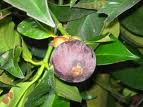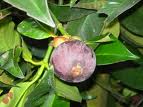Mangosteen is a delicious tropical fruit considered to be a veritable health fruit. It has been known to be rich in micronutrients.
Every 100 grams of edible mangosteen, it has up to 19 milligrams of potassium, 7 milligrams for each of sodium and calcium, 4.2 milligrams of vitamin C, 4 milligram of phosphorus, 1 milligram of iron and several milligrams of vitamins B1, B2 and niacin.
Although Mangosteen is primarily grown to be eaten fresh, it can also be preserved and processed as flavoring for ice cream.
The leaves and bark are used as astringent for aptha or thrush. The pericarp (outer layer of the fruit) used to cure diarrhea, its decoction use in the cure of dysentery. It can also be used as lotion and in dyeing as it contains 7 to 15% tannin.
Mangosteen is a delicious sweet fruit. It is a small and slow growing tropical evergreen tree with leathery leaves up to 10 inches long. Fruits are borne on lateral branches.
They have a thick rind which encloses five to seven freshly segments in which the seeds are embedded. The pulp which is the only part consumed has an excellent flavor.
Several researches and cultural management practices had been done on mangosteen production especially in addressing the long period before the tree bears fruit and its seasonality.
 Fertilizer application increases the yield of mangosteen and produces heavier fruits. Foliar or leaf fertilization with sulfur and calcium resulted in enhanced mangosteen growth and flowering.
Fertilizer application increases the yield of mangosteen and produces heavier fruits. Foliar or leaf fertilization with sulfur and calcium resulted in enhanced mangosteen growth and flowering.
The promising response of mangosteen to secondary nutrient foliar fertilization, farmers can now formulate their own sulfur quick lime (apog) fertilizer and spray fruit bearing trees, commercializing and using this technology could address the problem of under supply and unavailability of mangosteen.
